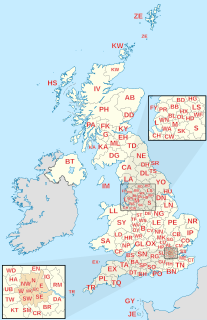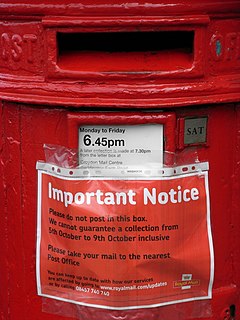The 1988 United Kingdom postal workers strike was a strike in the United Kingdom in August and September 1988. It was the country's first national postal strike for 17 years, [1] and began after postal workers at Royal Mail walked out in protest over bonuses being paid to recruit new workers in London and the South East. As a result, postal deliveries throughout the United Kingdom were disrupted for several weeks. [2]
The strike action started on 31 August when members of the Union of Communication Workers walked out to protest against 2.75% bonuses, and it was intended as a 24-hour stoppage. However, the strike continued after temporary workers were hired to clear the backlog of undelivered mail. [3] By 5 September the industrial action had spread with a quarter of the country's postal workers on strike, and by the time an agreement was reached the following week, the strike had spread throughout the British mainland (workers in Northern Ireland did not strike). No mail was being delivered by this point and, in order to ease the backlog of post, bosses at Royal Mail placed an embargo on the delivery of overseas mail. By the time the strike ended there was a backlog of 150 million undelivered letters and parcels. [2]
The postal strike sparked a rise in the sale of fax machines, which helped ease the impact of the strike.
The issue of temporary workers also led to some violence. In an incident at a sorting office in Liverpool, three men were arrested and charged with disorderly behaviour after pickets threw bottles at workers arriving at the facility. [3]
The strike came to an end on 13 September after union representatives and Royal Mail managers held talks over the preceding weekend. However, because of the backlog of mail, deliveries remained unreliable for several weeks afterwards. [2]
The strike led to a delay in the receipt of information concerning the September 1988 unemployment statistics which were briefly over-recorded as a result. [4]

The United States Postal Service is an independent agency of the executive branch of the United States federal government responsible for providing postal service in the United States, including its insular areas and associated states. It is one of the few government agencies explicitly authorized by the United States Constitution.

Postal codes used in the United Kingdom, British Overseas Territories and Crown dependencies are known as postcodes. They are alphanumeric and were adopted nationally between 11 October 1959 and 1974, having been devised by the General Post Office. A full postcode is known as a "postcode unit" and designates an area with several addresses or a single major delivery point.
Canada Post Corporation, trading as Canada Post, is a Crown corporation which functions as the primary postal operator in Canada. Originally known as Royal Mail Canada, rebranding was done to the "Canada Post" name in the late 1960s, even though it had not yet been separated from the government. On October 16, 1981, the Canada Post Corporation Act came into effect. This abolished the Post Office Department and created the present-day Crown corporation which provides postal service. The act aimed to set a new direction for the postal service by ensuring the postal service's financial security and independence.

Royal Mail Group plc is a British multinational postal service and courier company, originally established in 1516 as a department of the English government. The company's subsidiary Royal Mail Group Limited operates the brands Royal Mail (letters) and Parcelforce Worldwide (parcels). GLS Group, an international logistics company, is a wholly owned subsidiary of Royal Mail Group. The group used the name Consignia for a brief period in the early 2000s.
The Communication Workers Union (CWU) is the main trade union in the United Kingdom for people working for telephone, cable, digital subscriber line (DSL) and postal delivery companies. It has 110,000 members in Royal Mail as well as more in many other communication companies.

The Public and Commercial Services Union (PCS) is the sixth largest trade union in the United Kingdom. Most of its members work in UK government departments and other public bodies.

A mail carrier, mailman, mailwoman, postal carrier, postman, postwoman, or letter carrier, sometimes colloquially known as a postie, is an employee of a post office or postal service, who delivers mail and parcel post to residences and businesses. The term "mail carrier" came to be used as a gender-neutral substitute for "mailman" soon after women began performing the job. In the Royal Mail, the official name changed from "letter carrier" to "postman" in 1883, and "postwoman" has also been used for many years.

Adam Alexander Crozier is a Scottish businessman, and was formerly the chief executive officer of media company ITV plc, operator of the ITV television network covering most of the United Kingdom.
The Grunwick dispute was a British industrial dispute involving trade union recognition at the Grunwick Film Processing Laboratories in Chapter Road, Dollis Hill in the London suburb of Willesden, that led to a two-year strike between 1976 and 1978.

The 2007 Royal Mail industrial disputes were a series of industrial disputes between Royal Mail and the Communication Workers Union in the United Kingdom.
The terms Spanish practices or old Spanish customs are British expressions that refer to irregular or restrictive practices in workers' interests. Typically, these are arrangements that have been negotiated in the past between employers and unions.
The term postal strike or mail strike may refer to:
Usually referred to as the "New South Wales General Strike", but referred to by contemporaries as "the Great Strike", it was in fact neither general nor confined to NSW. The strike was however a mass strike, involving around 100,000 workers, mostly in NSW and Victoria. It began in the Australian state of New South Wales and spread to other states over six weeks from 2 August to 8 September 1917 when the official leadership declared the strike over. It took two weeks for all the railway strikers to return, however, as rank and file meetings initially rejected the official capitulation. Outside the railways, significant groups such as the waterside workers in Sydney and Melbourne, and the Hunter Valley coal mines remained out until November as in their case the use of strikebreakers had turned the strike into a lockout.
The 2009 Lindsey Oil Refinery strikes were a series of wildcat strikes that affected the energy industry in the United Kingdom in 2009. The action involved workers at around a dozen energy sites across the UK who walked out in support of other British workers at the Total's Lindsey Oil Refinery. The Lindsey Oil Refinery construction workers went on strike because employment was not offered to them on a £200 million construction contract to build a hydro desulphurisation unit at the site.

The 2009 Royal Mail industrial disputes is an industrial dispute in the United Kingdom involving Royal Mail and members of the Communication Workers Union (CWU), which began in the summer of 2009. It was the country's first industrial action involving postal workers since 2007 and came about after the Communication Workers Union accused Royal Mail of refusing to enter into dialogue regarding how the implementation of modernisation plans would affect the job security of postal workers.

The 1971 United Kingdom postal workers strike was a strike in the United Kingdom staged by postal workers between January and March 1971.

General Logistics Systems B.V., also known as GLS, is a British-owned logistics company based in Amsterdam, Netherlands. The company was known as German Parcel when it was founded in 1989, by Rico Back. It was subsequently rebranded as GLS and is now a subsidiary of Royal Mail.

A mail satchel is a type of mail bag that a letter carrier uses over-the-shoulder for assisting the delivery of personal mail on a designated route.

Cardiff Mail Centre is the main headquarters and sorting office for Royal Mail in Cardiff, Wales and one of the main mail centres for the southwest of the United Kingdom.
The 2020-2021 United States Postal Service crisis is a series of events that have caused backlogs and delays in the delivery of mail by the United States Postal Service (USPS). The crisis stems primarily from changes implemented by Postmaster General Louis DeJoy shortly after taking office in June 2020. The delays have had substantial legal, political, economic, and health repercussions.